Traditional Chinese Virtues——中国传统美德
新视野 Book 1-U 7课后翻译答案
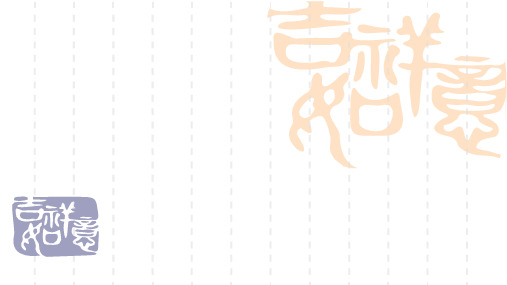
中国书法不仅是中华民族的文化瑰宝,而且在世界文化艺术宝 库中独放异彩。 As one of the treasures of Chinese culture, Chinese calligraphy shines splendidly in the world's treasure house of culture and art.
NHCE-BOOK 1 翻译-汉译英
汉译英-Unit 7:
为人诚信,以和为贵是中华民族的传统美德。"和"的思想 体现在很多方面。在处理人与人的关系上,中国传统思想 主张"和为贵"以及"家和万事兴",从而创造一个和谐的社会 环境。在人与自然的关系上,人类应当学会认识自然,尊 重自然,保护自然。人与人、人与社会、人与自然都需要" 和谐"。如今,和谐发展依然是我们的治国之本和管理人才 之道。随着我国社会经济和文化的发展,"和"的思想更加 深入人心。中国正在向构建社会主义和谐社会的目标迈进。
汉字在漫长的演变发展过程中,一方面起着交流思想、继承文化的重要 作用,另一方面它本身又形成了一种独特的艺术。
In this long evolutionary process, Chinese characters have not only played an important role in exchanging ideas and transmitting culture but also developed into(变成) a unique art form.
书法能够通过作品把书法其人”的说法。
Calligraphic works well reflect calligraphers' personal feelings, knowledge, self-cultivation, personality, and so forth, thus there is an expression/a saying that "seeing the calligrapher's handwriting is like seeing the person".
中国传统美德英语小作文

中国传统美德英语小作文Title: Traditional Chinese Virtues in English。
In the rich tapestry of Chinese culture, traditional virtues hold a significant place, shaping the moral fabric of society for millennia. These virtues, deeply rooted in Confucianism, Taoism, and Buddhism, continue to influence Chinese people's behavior and outlook on life. Let's delve into some of these traditional virtues and their relevance in contemporary society.1. Ren (仁) Benevolence and Kindness: Ren emphasizes empathy, compassion, and kindness towards others. It's about treating others with respect and sincerity, regardless of their social status or background. In today's world, where conflicts and divisions often dominate, practicing Ren can foster harmony and understanding among people. Simple acts of kindness, such as helping a stranger in need or showing patience and tolerance in difficult situations, can go a long way in promoting a morecompassionate society.2. Yi (义) Righteousness and Justice: Yi entails doing what is morally right and just, even in the face of adversity. It involves standing up for principles and fairness, even when it's not the popular or easy choice. In a rapidly changing and sometimes chaotic world, upholdingYi can serve as a moral compass, guiding individuals and societies towards ethical behavior and social justice. Whether it's speaking out against injustice, fighting for equality, or adhering to one's principles in the face of temptation, practicing Yi is essential for a just and equitable society.3. Li (礼) Propriety and Etiquette: Li encompasses proper conduct, etiquette, and manners in social interactions. It emphasizes respect for traditions, customs, and social norms. While the specifics of Li may vary across different cultures and contexts, its essence lies in fostering harmony and mutual respect in human relationships. In today's globalized world, where cultures often collide and diversity is celebrated, understanding and practicingLi can facilitate smoother communication and interactions among people from different backgrounds. By showing respect for others' customs and traditions while also maintaining one's own cultural identity, individuals can contribute to a more inclusive and harmonious society.4. Xiao (孝) Filial Piety: Xiao emphasizes the importance of honoring and respecting one's parents and elders. It's about recognizing the sacrifices they have made and repaying their love and care with gratitude and devotion. In an era where family structures are evolving, and intergenerational relationships are sometimes strained, the value of Xiao remains as relevant as ever. Cultivating filial piety not only strengthens family bonds but also instills a sense of responsibility and empathy towards others. By cherishing and supporting our elders, we not only honor our cultural heritage but also create a supportive and caring environment for future generations.5. Zhong (忠) Loyalty: Zhong signifies loyalty, faithfulness, and devotion to one's family, friends, and country. It's about standing by those we care about,especially in times of adversity or challenge. In today's fast-paced and interconnected world, where loyalty is often tested and relationships can be fleeting, the value of Zhong lies in its ability to foster trust, commitment, and solidarity. Whether it's remaining loyal to one's employer, supporting friends in times of need, or staying true toone's principles, practicing Zhong builds stronger bonds and communities based on trust and mutual support.In conclusion, traditional Chinese virtues embody timeless principles that continue to guide and inspire individuals in their personal and social lives. By embracing these virtues and integrating them into our daily actions and interactions, we can contribute to a more harmonious, compassionate, and just society, both in China and beyond. As we navigate the complexities of the modern world, let us not forget the wisdom of our ancestors and the enduring value of traditional virtues in shaping a brighter future for all.。
介绍中国传统美德的英语作文
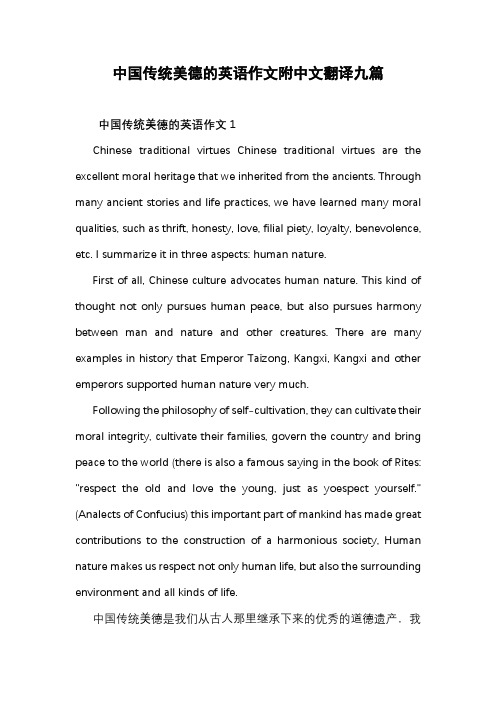
中国传统美德的英语作文附中文翻译九篇中国传统美德的英语作文1Chinese traditional virtues Chinese traditional virtues are the excellent moral heritage that we inherited from the ancients. Through many ancient stories and life practices, we have learned many moral qualities, such as thrift, honesty, love, filial piety, loyalty, benevolence, etc. I summarize it in three aspects: human nature.First of all, Chinese culture advocates human nature. This kind of thought not only pursues human peace, but also pursues harmony between man and nature and other creatures. There are many examples in history that Emperor Taizong, Kangxi, Kangxi and other emperors supported human nature very much.Following the philosophy of self-cultivation, they can cultivate their moral integrity, cultivate their families, govern the country and bring peace to the world (there is also a famous saying in the book of Rites: "respect the old and love the young, just as yoespect yourself." (Analects of Confucius) this important part of mankind has made great contributions to the construction of a harmonious society, Human nature makes us respect not only human life, but also the surrounding environment and all kinds of life.中国传统美德是我们从古人那里继承下来的优秀的道德遗产,我们通过许多古老的故事和生活实践,学到了许多道德品质,如节俭、诚实、慈爱、孝顺、忠诚、仁爱等等。
Traditional_Chinese_Virtues_中国传统美德

Translated by 新华网
Other examples of Virtues
• Honesty 诚实 • Courage 勇敢 • Compassion 同情心 • Generosity 慷慨 • Integrity 正直 • Fairness 公平 • Self-control 自制 • Prudence 谨慎 • Thrift 节俭
From Confucian ideology
• TZU Chang asked Confucius a question about Moral virtue. Confucius replied, “Moral virtue simply consists in being able, anywhere and everywhere, to exercise five particular qualities.” Asked what these were, he said: “Self-respect, magnanimity(宽宏大量), sincerity, earnestness, and benevolence. Show self-respect, and others will respect you; be magnanimous, and you will win all hearts; be sincere, and men will trust you; be earnest, and you will achieve great things; be benevolent, and you will be fit to impose your will on others."
新视野大学英语读写教程汉译英
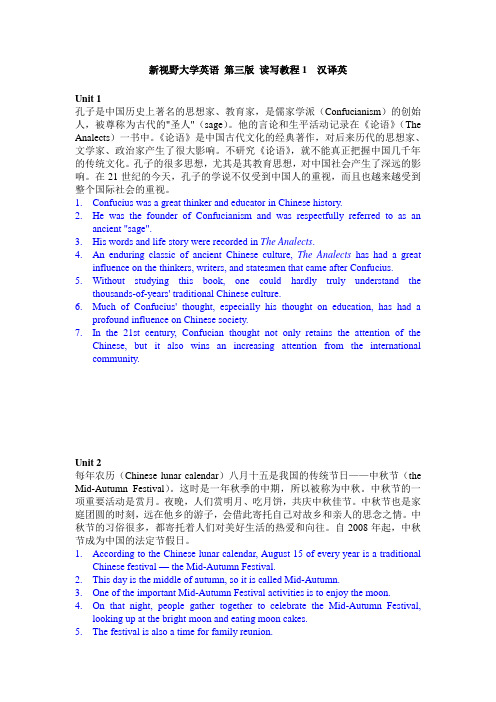
新视野大学英语第三版读写教程1 汉译英Unit 1孔子是中国历史上著名的思想家、教育家,是儒家学派(Confucianism)的创始人,被尊称为古代的"圣人"(sage)。
他的言论和生平活动记录在《论语》(The Analects)一书中。
《论语》是中国古代文化的经典著作,对后来历代的思想家、文学家、政治家产生了很大影响。
不研究《论语》,就不能真正把握中国几千年的传统文化。
孔子的很多思想,尤其是其教育思想,对中国社会产生了深远的影响。
在21世纪的今天,孔子的学说不仅受到中国人的重视,而且也越来越受到整个国际社会的重视。
1.Confucius was a great thinker and educator in Chinese history.2.He was the founder of Confucianism and was respectfully referred to as anancient "sage".3.His words and life story were recorded in The Analects.4.An enduring classic of ancient Chinese culture, The Analects has had a greatinfluence on the thinkers, writers, and statesmen that came after Confucius.5.Without studying this book, one could hardly truly understand thethousands-of-years' traditional Chinese culture.6.Much of Confucius' thought, especially his thought on education, has had aprofound influence on Chinese society.7.In the 21st century, Confucian thought not only retains the attention of theChinese, but it also wins an increasing attention from the international community.Unit 2每年农历(Chinese lunar calendar)八月十五是我国的传统节日——中秋节(the Mid-Autumn Festival)。
中国传统美德 英文

中国传统美德英文Traditional Virtues in ChinaIn Chinese culture, there are several traditional virtues that are highly valued and emphasized. These virtues are considered important for individuals to cultivate and uphold in order to live a harmonious and meaningful life. Here are some examples of traditional virtues in China:1. Filial piety (孝顺): Filial piety refers to the respect and care that younger generations should have for their elders, especially their parents. It encompasses duties such as obeying parents' wishes, providing for their needs, and showing gratitude for their upbringing.2. Benevolence (仁爱): Benevolence or kindness is an important virtue in Chinese culture. It promotes a sense of empathy and compassion towards others, encouraging individuals to treat others with respect, fairness, and understanding.3. Honesty (诚实): Honesty is highly valued in Chinese society. It involves being truthful, trustworthy, and having integrity in all aspects of life. Honesty is seen as a virtue that builds trust and fosters harmonious relationships.4. Humility (谦虚): Humility is considered a virtue that cultivates modesty and a lack of arrogance. It involves understanding one's own imperfections and limitations, and being respectful and considerate towards others.5. Perseverance (毅力): Perseverance is seen as an important virtue in Chinese culture. It encompasses the ability to persist and endure hardships in order to achieve one's goals. It promotes a strong work ethic and a determination to overcome challenges.6. Loyalty (忠诚): Loyalty is highly valued in Chinese culture, especially loyalty towards one's family, friends, and country. It involves being faithful, supportive, and committed to one's relationships and responsibilities.7. Harmony (和谐): Harmony is a core value in Chinese culture. It emphasizes the importance of living in peace, balance, and harmony with oneself, others, and the environment. It involves seeking consensus and avoiding conflicts.These traditional virtues have played a significant role in shaping Chinese society and guiding individuals in their daily lives. They are seen as moral principles that promote personal growth, social harmony, and a cohesive community. Though the world is changing rapidly, these virtues still hold relevance and continue to be passed on from generation to generation in Chinese society.。
美德作文之中华美德文化英语作文
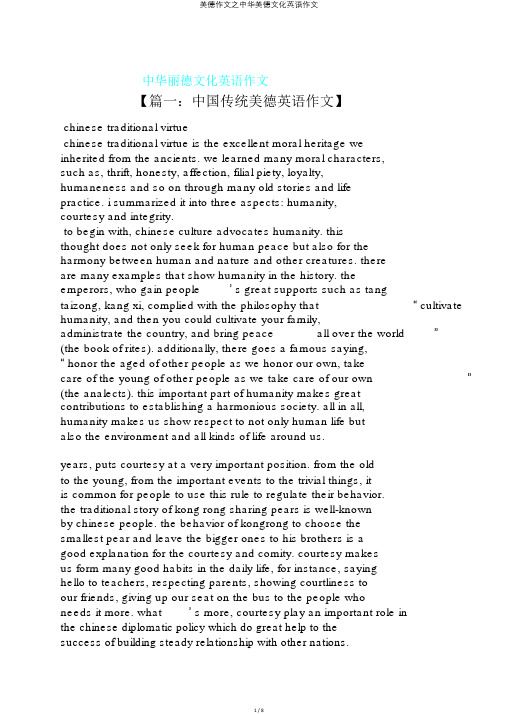
中华丽德文化英语作文【篇一:中国传统美德英语作文】chinese traditional virtuechinese traditional virtue is the excellent moral heritage weinherited from the ancients. we learned many moral characters,such as, thrift, honesty, affection, filial piety, loyalty,humaneness and so on through many old stories and lifepractice. i summarized it into three aspects: humanity,courtesy and integrity.to begin with, chinese culture advocates humanity. thisthought does not only seek for human peace but also for theharmony between human and nature and other creatures. thereare many examples that show humanity in the history. theemperors, who gain people’ s great supports such as tangtaizong, kang xi, complied with the philosophy that“ cultivate humanity, and then you could cultivate your family,administrate the country, and bring peace all over the world”(the book of rites). additionally, there goes a famous saying,“ honor the aged of other people as we honor our own, takecare of the young of other people as we take care of our own”(the analects). this important part of humanity makes greatcontributions to establishing a harmonious society. all in all,humanity makes us show respect to not only human life butalso the environment and all kinds of life around us.years, puts courtesy at a very important position. from the oldto the young, from the important events to the trivial things, itis common for people to use this rule to regulate their behavior.the traditional story of kong rong sharing pears is well-knownby chinese people. the behavior of kongrong to choose thesmallest pear and leave the bigger ones to his brothers is agood explanation for the courtesy and comity. courtesy makesus form many good habits in the daily life, for instance, sayinghello to teachers, respecting parents, showing courtliness toour friends, giving up our seat on the bus to the people whoneeds it more. what’ s more, courtesy play an important role inthe chinese diplomatic policy which do great help to thesuccess of building steady relationship with other nations.last but not least, chinese ethics place a great emphasison integrity. it is the basicprinciple when we get along with others. for this reason, i regardit as the most important rule we should obey to regulate ourbehavior. integrity is needed in every field of our life. to behonest and sincere is the fundamental thing to be a humanbeing. just as the famous saying of socrates“ the dishonest life is not worth living ” . moreover, honesty and integrity isnecessary when we are handling the relationship with friendsand family members. keeping secrets among family andfriends often harm them deliberately or in deliberately. still, in abusiness perspective, integrity is mainly with sincere reception,fair trade, abiding by the contract, pay the liabilities in time,and not cooking the books, etc. as a student, we show ourintegrity through pursuing the true academic knowledge,obeying the discipline of test, using the true and correctinformation to compete in all kinds of award selection.in summary, i am deeply convinced that all these great virtueshad, have and still will have tremendous effect on the field ofregulating people ’ s behaviors. the chinese traditional virtues arenot only the essence of ancient moral civilization, but alsothe cohesion of chinese national family. great efforts areessential for us to make in order to pursue and inherit all theseinvisible spiritual culture heritages.【篇二:中华传统美德征文】传统美德遍布华夏流年纪月,轻轻的打开了中华民族的史册,点点滴滴的文字,栩栩如生的画面,交叉成中华民族历经沧桑的光阴,勾画出中华民族久经不衰的历史。
中华传统美德书信作文
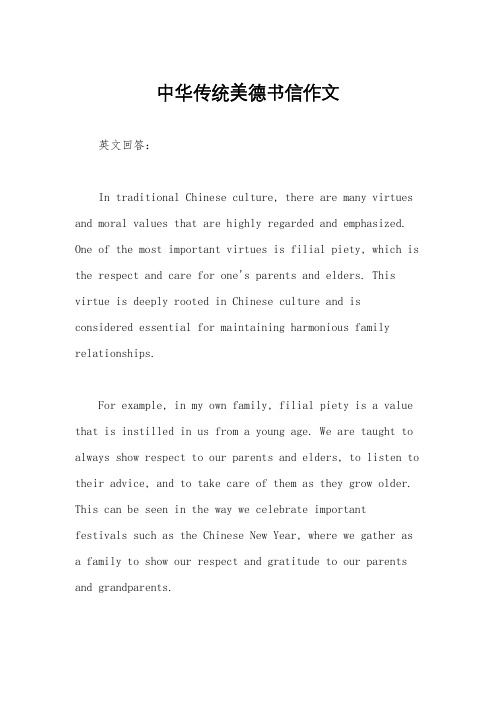
中华传统美德书信作文英文回答:In traditional Chinese culture, there are many virtues and moral values that are highly regarded and emphasized. One of the most important virtues is filial piety, which is the respect and care for one's parents and elders. This virtue is deeply rooted in Chinese culture and is considered essential for maintaining harmonious family relationships.For example, in my own family, filial piety is a value that is instilled in us from a young age. We are taught to always show respect to our parents and elders, to listen to their advice, and to take care of them as they grow older. This can be seen in the way we celebrate importantfestivals such as the Chinese New Year, where we gather as a family to show our respect and gratitude to our parents and grandparents.Another important virtue in Chinese culture is humility. This is the idea of being modest and not putting oneself above others. In Chinese society, humility is valued as a way of maintaining harmony and showing respect to others.In my own experience, I have seen the importance of humility in my interactions with others. For example, whenI was in school, I always tried to be humble and respectful towards my teachers and classmates. This attitude helped me to build positive relationships and gain the respect of others.中文回答:在中国传统文化中,有许多美德和道德价值观备受重视。
- 1、下载文档前请自行甄别文档内容的完整性,平台不提供额外的编辑、内容补充、找答案等附加服务。
- 2、"仅部分预览"的文档,不可在线预览部分如存在完整性等问题,可反馈申请退款(可完整预览的文档不适用该条件!)。
- 3、如文档侵犯您的权益,请联系客服反馈,我们会尽快为您处理(人工客服工作时间:9:00-18:30)。
What are traditional Chinese virtues?
• Benevolence/ Humanity 仁 • Righteousness 義 • Propriety 禮 • Wisdom 智 • Fidelity/Sincerity 信
From Confucian ideology
• TZU Chang asked Confucius a question about Moral virtue. Confucius replied, “Moral virtue simply consists in being able, anywhere and everywhere, to exercise five particular qualities.” Asked what these were, he said: “Self-respect, magnanimity(宽宏大量), sincerity, earnestness, and benevolence. Show self-respect, and others will respect you; be magnanimous, and you will win all hearts; be sincere, and men will trust you; be earnest, and you will achieve great things; be benevolent, and you will be fit to impose your will on others."
wallow in luxuries and pleasures.
Translated by 新华网
Other examples of Virtues
• Honesty 诚实 • Courage 勇敢 • Compassion 同情心 • Generosity 慷慨 • Integrity 正直 • Fairness 公平 • Self-control 自制 • Prudence 谨慎 • ThrifCultivate oneself, put your family in order, run the local government well, and bring peace to the entire country.
十大中国传统美德
• 仁爱孝悌 • 谦和好礼 • 诚信知报 • 精忠爱国 • 克己奉公
Translated by 中青网
Eight Honors,Eight Disgraces
• Love the country; do it no harm. • Serve the people; do no disservice. • Follow science; discard ignorance. • Be diligent; not indolent. • Be united, help each other; make no
gains at other’s expense. • Be honest and trustworthy; do not
spend ethics for profits. • Be disciplined and law-abiding; not
chaotic and lawless. • Live plainly, struggle hard; do not
Eight Do's and Eight Don'ts
• Love, do not harm the motherland. • Serve, don't disserve the people. • Uphold science; don't be ignorant and
unenlightened. • Work hard; don't be lazy and hate work. • Be united and help each other; don't
• 修己慎独 • 见利思义 • 勤俭廉正 • 笃实宽厚 • 勇毅力行
• 拾金不昧 • 勤劳勇敢 • 忍辱负重 • 自强不息 • 助人为乐
• return to the owner what one has picked up
• industrious and brave /industry and bravery
• suffer disgrace and insults in order to accomplish a task
• exert and strive hard without any let up
• willing to help
八荣八耻
以热爱祖国为荣 以危害祖国为耻 以服务人民为荣 以背离人民为耻 以崇尚科学为荣 以愚昧无知为耻 以辛勤劳动为荣 以好逸恶劳为耻 以团结互助为荣 以损人利己为耻 以诚实守信为荣 以见利忘义为耻 以遵纪守法为荣 以违法乱纪为耻 以艰苦奋斗为荣 以骄奢淫逸为耻
gain benefits at the expense of others. • Be honest and trustworthy, not profit-
mongering at the expense of your values. • Be disciplined and law-abiding instead of chaotic and lawless. • Know plain living and hard struggle; do not wallow in luxuries and pleasures.
